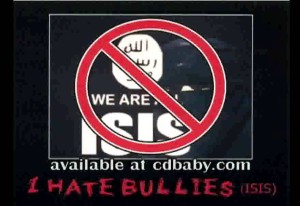Bully (verb): “use superior strength or influence to intimidate (someone), typically to force him or her to do what one wants.” [Google]
Sadism (noun): “the act of gaining pleasure from inflicting physical or psychological pain on another.” [Medical Dictionary]
Since we’re all rightly preoccupied with the terrorist attack on Paris last week, let’s look at a common human dynamic that may partially explain violent Islamic jihadism by Dáesh, an unflattering Arabic term for ISIS/ISIL (Islamic State in Syria/…in the Levant).
Muslim orthodoxy usually includes a degree of tolerance for the other “people of the Book”, Jews and Christians whose faiths also descend from their common patriarch Abraham. The ideology behind Islamic terror reflects a fundamentalist, aggressive reading of the Quran and hadiths. They explicitly justify proselytizing by conquest and adherence to Islam under penalty of death. These convictions drove the original expansion of Islam during the Middle Ages, and eventually is to result in universal Islamic rule under a single Caliphate.
This is now the impetus for proclaiming the Islamic State, led by its first caliph, Abu Bakr al-Baghdadi. This religious drama is being played out in Syria and Iraq in the Middle East and increasingly around the world by terrorists inspired by this ideology to commit violence that they deem righteous.
Thinking about this vicious religious warfare as bullying may seem to minimize it, but bullying isn’t limited to the schoolyard. What else is the intimidation of unwilling, less powerful people with the intent to force compliance with the dominator’s demands? Groupthink and religious differences can make bullying a minority more likely.
This bullying is being carried out with exceptional cruelty and terror on defenseless innocents, on its home ground as well as abroad. Because it is praised and rewarded by the jihadist hierarchy and obviously enjoyed by its perpetrators, it is sadistic.
Even the more particular meaning of “sadism”, the infliction of pain being sexually gratifying, pertains here. The belief (or excuse) that raping non-Muslim women is a holy act, even a gift to the women, fits that. Remember how al-Baghdadi himself was reported by escaped Yazidi women to keep sex slaves and to have repeatedly raped the American hostage Kayla Mueller?
School age bullies tend to be children who have been badly disciplined and poorly respected. They are commonly bullied or abused themselves, and develop few of the ordinary social skills that enable kids to engage with others and enjoy positive peer relationships. Then their bullying perpetuates those deficits. That sounds like both the history of many Arab men in the chaotic, poverty-stricken Middle East and the position of “Islamic State” among the nations.
This is one way to understand what we are dealing with, not to empathize with or excuse the barbarous behavior of these individuals and their polity. Childhood bullies usually stop when firmly opposed, the earlier the better. This usually has to be done with the support of adults clearly backing the victims or by their direct intervention. They may be parents, school authorities, and occasionally the police when bullying becomes criminal in nature.
It takes much stronger peer or higher intervention to obstruct the bullying of other adults or states. This at least means demonstrating the capacity to respond physically to stop it, and may require carrying out that response, no different than with kids except in degree. Any consequences threatened must be carried out; if not, there will be no change and less likelihood of it in the future. (See crossing “a red line”.)
This doesn’t mean talking to them, counseling them, or sympathizing with them (i.e., diplomacy alone). These approaches might help the bully change, but only after other authority is accepted. They won’t halt their behavior and relieve the victims without external control. That must happen first, for the victims’ sake and so that the bully learns it is in his interest to change.
So displaying superior power is necessary in handling bullies. This may be the greater physical presence of an adult directing a child, a firearm presented when an individual is confronted, or the military might of a stronger faction or one or more nations. Then, regardless of strength, there has to be the will to use it. Force may only need to be implied (e.g., in managing most children), or it may need to be explicitly threatened (which is usually enough in individual confrontations).
It may well have to be used—sometimes individually, too often internationally, and certainly with terrorists of any stripe. Effective power can be economic or military, but unless the physical option is clearly available nothing else alone will change behavior. A hallway fight has to be broken up if the principal’s commanding presence isn’t enough. It’s unavoidable with aggressors for whom savagery is sanctified and dying a martyr means eternal joy.
This Sunday our pastor, who is very firm on our living as Christ-like lives as possible, shared his first reaction to this latest terrorist eruption. “Carpet bomb Raqqa!” He chastised himself, because that was a vengeful, hateful reaction that descends to their level. But he went on to teach the right response: “justice”. That doesn’t mean disrupting or degrading these evil-doers’ capacity. It means defeating them unequivocally, for our protection and that of all their victims, before they commit more atrocities.
There are just no shortcuts to stopping bullies. They have to be faced down. That becomes desperately critical when sadistic brutality is driven by faith and reward within a closed society, whether state-sponsored or religiously sanctioned. Dáesh is both.

— DRGO editor Robert B. Young, MD is a psychiatrist practicing in Pittsford, NY, an associate clinical professor at the University of Rochester School of Medicine, and a Distinguished Life Fellow of the American Psychiatric Association.

